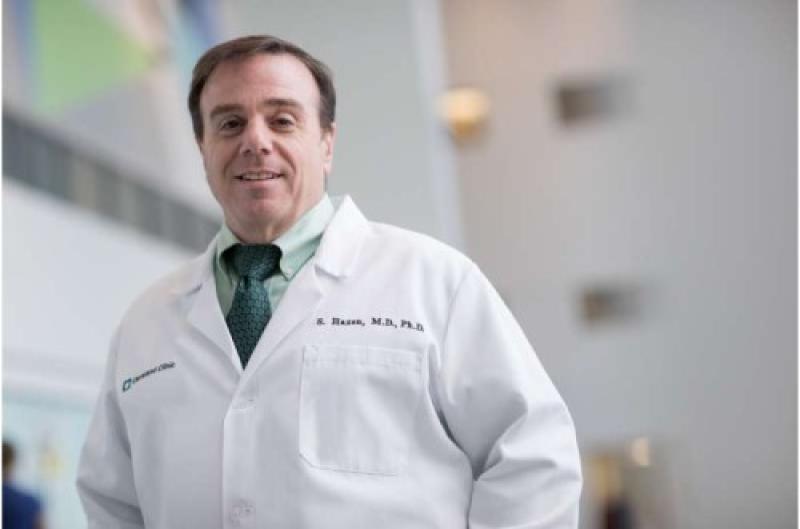Researchers identify how red meat increases cardiovascular disease risk


Cleveland Clinic-led study has revealed new insights into how a diet rich in red meat increases risk for cardiovascular disease. The findings were published in Nature Microbiology and build on more than a decade of research by lead author Stanley Hazen, MD, Ph.D.
In a previous series of landmark studies, Dr. Hazen found that a byproduct that forms when gut bacteria digest certain nutrients abundant in red meat and other animal products—called TMAO (trimethylamine N-oxide)—increases the risk of heart disease and stroke.
The latest findings offer a more comprehensive understanding of the two-step process by which gut microbes convert the nutrient carnitine into TMAO, an atherosclerosis- and blood clot-promoting molecule, following the ingestion of a red meat-rich diet.
"These new studies identify the gut microbial gene cluster responsible for the second step of the process that links a red meat-rich diet to elevated cardiac disease risks," said Dr. Hazen, who directs the Cleveland Clinic Center for Microbiome & Human Health . "This discovery helps point us towards new therapeutic targets to prevent or reduce diet-associated cardiovascular disease risk."
In 2018, Dr. Hazen published results in the Journal of Clinical Investigation showing that dietary carnitine is converted into TMAO in the gut through a two-step, two microbe process. An intermediary metabolite in this process is a molecule called γBB (gamma-butyrobetaine).
According to Dr. Hazen, multiple gut microbes can convert dietary carnitine to γBB, but very few can transform the molecule to TMA, the precursor to TMAO. "In omnivores, Emergencia timonensis is the primary human gut microbe involved in the transformation of γBB to TMA/TMAO. Conversely, long-term vegetarians and vegans have very low levels of this microbe in their gut and therefore have minimal to no capacity to convert carnitine into TMAO."
The researchers studied the relationship between fasting plasma γBB levels and disease outcomes using samples and clinical data collected from nearly 3,000 patients. Higher γBB levels were associated with cardiovascular disease and major adverse events including death, non-fatal heart attack or stroke.
To understand the mechanistic link between γBB and the observed outcomes in patients, the researchers studied fecal samples collected from mice and patients, as well as preclinical models of arterial injury. They found that introducing E. timonensis completes the transformation of carnitine to TMAO, elevates TMAO levels and enhances blot clot potential.
The researchers used sequencing technology to identify the relevant gut microbial gene cluster. The cluster was named the gbu (gamma-butyrobetaine utilization) gene cluster, based on its newly discovered function, and includes six genes. They found that in the presence of γBB, the expression of all six genes in the gbu gene cluster increases and that four genes ( gbuA, gbuB, gbuC and gbuE ) are critical in the conversion of γBB to TMA/TMAO.
"By studying patient samples, we saw that the abundance of gbuA is significantly associated with a diet rich in red meat and plasma TMAO levels," said Dr. Hazen, who is also chair of the Department of Cardiovascular Disease & Metabolic Sciences and a practicing physician. "Patients who transitioned to a non-meat diet went on to exhibit reduced gut microbial levels of gbuA . Taken together, this suggests that dietary modifications may help reduce diet- and TMAO- associated cardiovascular disease risk. Likewise, the role of the gbu gene cluster may be worth exploring as a potential therapeutic target."









Here's the 'beef' of the article...
If we could eliminate E. timonensis from our gut microbiomes we might be able to enjoy red meat without cardiovascular risks.
But how do we do that? How do we isolate and destroy a single microbial species from our guts without harming others that we need?
Maybe some kind of gene therapy that only targets and disables the gbu gene cluster?
great, cheeseburgers kill. any wiggle room or adjustment between well done and a couple notches past sushi? fuck it, I'm mid-sixties and can barely tolerate chicken, they can have my cheeseburger when they pry it out of my cold dead hand.
I was just now wondering about the possibility of a supplement that could react with TMAO in our guts and chemically convert into something safe. I don't know if that's possible, but if it is, then maybe it could be incorporated into daily vitamins. I'm pretty darn sure I would take something like that religiously. Cardio problems and strokes run in my family.
or just reduce or eliminate red meat consumption.
My bride had a lot of small issues and decided to stop eating red meat because that helped her sister immensely.
No more stomach aches or heartburn, better skin color and some weight loss etc. All good things
Grew up living on wild game, deer, bear, moose, etc along with a lot of fish. Much better for you.
It is when it comes to saturated fats, but I don't know about the TMAO thing. Maybe, though.
Deer, bear, and moose are considered red meat to the body.
Most wild game meat is very lean compared to feed lot beef. Bear meat isn't usually lean though because most states have bear season in the fall when they're all fattened up for winter.
It's not about lean vs non-lean, its about the compound trimethylamine N-oxide. This is found in red meat, eggs, dairy products and salt-water fish and have choline, lecithin, and carnitine.